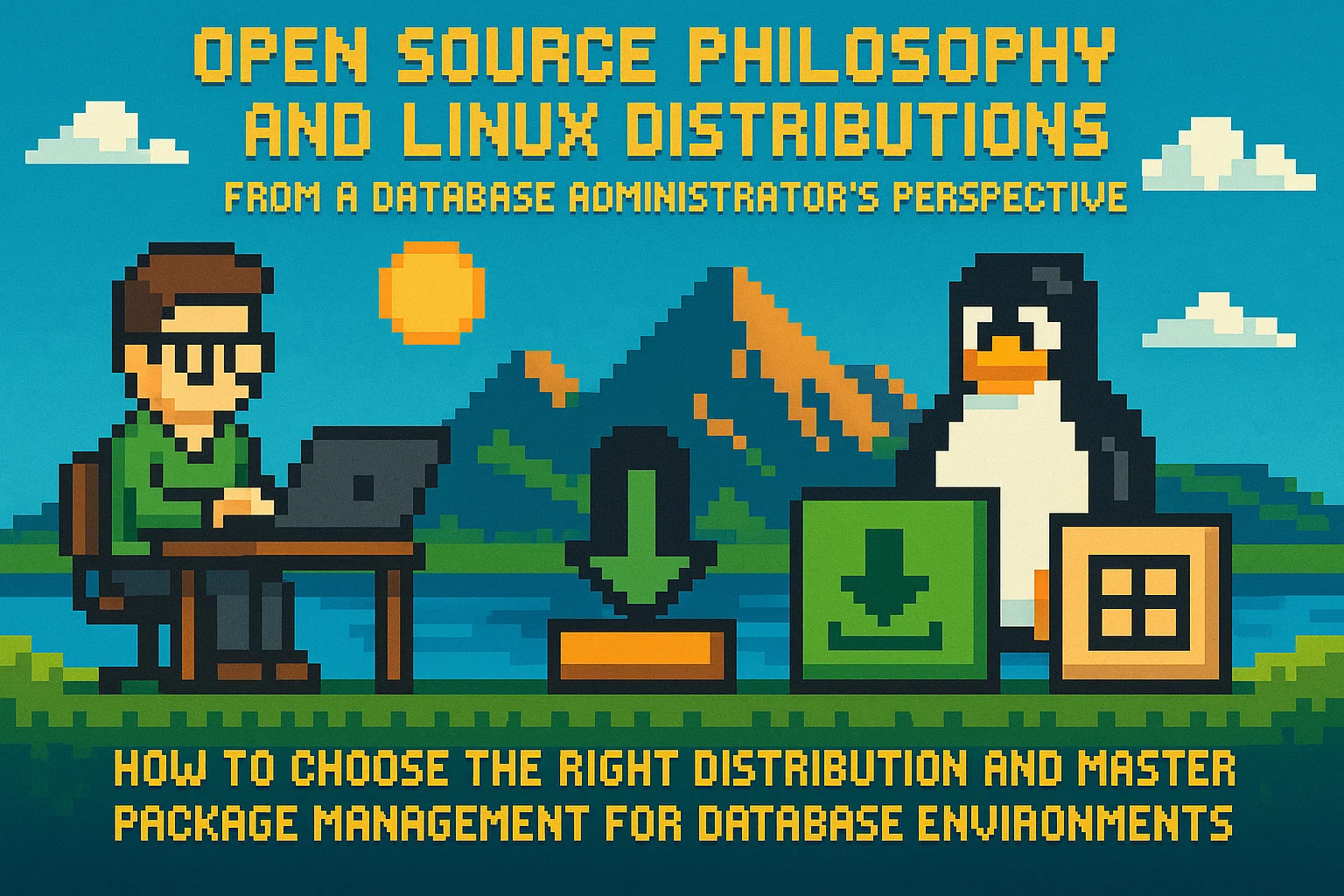Embracing Open Source: A DBA’s Foundation in the World of Free Software

Table of Contents
As I embark on my journey as a Database Administrator, I believe it’s crucial to start with the philosophical foundation that shapes much of our industry: Open Source Software. Understanding this philosophy isn’t just about choosing the right tools, it’s about embracing a mindset that will guide one’s entire career in data management.
The Open Source Philosophy: More Than Just Free Software⌗
Open source isn’t merely about cost savings. It’s about transparency, collaboration, and community-driven innovation. For a DBA, this philosophy translates into several practical advantages:
- Transparency: You can examine the actual code running your critical systems
- Security: Community scrutiny (may) often results in more secure software
- Customization: Ability to modify software to meet specific business needs
- Community Support: Access to vast knowledge bases and expert communities
- Vendor Independence: Freedom from vendor lock-in and licensing restrictions
When Richard Stallman initiated the GNU Project and Linus Torvalds created Linux, they didn’t just build software, they created an ecosystem that would eventually power most of the world’s databases, web servers, and cloud infrastructure.
Linux Distributions: The Foundation of Database Infrastructure⌗
As DBAs, we spend most of our time working on Linux systems. Understanding different distributions and their characteristics is fundamental to making informed infrastructure decisions.
Enterprise-Grade Distributions⌗
Red Hat Enterprise Linux (RHEL) / CentOS / Rocky Linux
- Target Audience: Enterprise environments requiring stability and long-term support
- Package Manager: YUM/DNF (RPM-based)
- Strengths: Enterprise support, security certifications, predictable release cycles
- Use Case: Production database servers, especially Oracle and PostgreSQL deployments
Ubuntu LTS (Long Term Support)
- Target Audience: Both enterprise and development environments
- Package Manager: APT (DEB-based)
- Strengths: Excellent hardware support, large community, frequent updates
- Use Case: Cloud deployments, PostgreSQL clusters, development environments
SUSE Linux Enterprise Server (SLES)
- Target Audience: Enterprise environments, particularly in Europe
- Package Manager: Zypper (RPM-based)
- Strengths: Strong enterprise features, excellent SAP integration
- Use Case: SAP HANA deployments, high-availability clusters
Development and Learning Distributions⌗
Debian
- Philosophy: Pure open source, stability-focused
- Package Manager: APT
- Strengths: Rock-solid stability, extensive package repository
- Use Case: Servers where maximum stability is required
Fedora
- Philosophy: Cutting-edge features, testing ground for RHEL
- Package Manager: DNF
- Strengths: Latest software versions, innovative features
- Use Case: Development environments, testing new database features
Arch Linux
- Philosophy: Simplicity, user control, rolling release
- Package Manager: Pacman
- Strengths: Always up-to-date, minimalist approach
- Use Case: Advanced users, custom database lab environments
Choosing the Right Distribution: A DBA’s Criteria⌗
When selecting a Linux distribution for database workloads, consider these factors:
1. Stability and Support Lifecycle⌗
For production databases, prioritize distributions with:
- Long-term support (5+ years)
- Predictable release cycles
- Enterprise support options
- Security patch availability
2. Package Availability and Management⌗
Evaluate:
- Database software availability in official repositories
- Package manager efficiency and reliability
- Third-party repository quality (EPEL, PPAs)
- Container ecosystem support
3. Performance and Resource Efficiency⌗
Consider:
- Kernel tuning capabilities
- Memory management efficiency
- I/O scheduler options
- NUMA awareness
4. Security Features⌗
Look for:
- SELinux/AppArmor integration
- Firewall management tools
- Audit logging capabilities
- Compliance certifications
5. Community and Documentation⌗
Assess:
- Community size and activity
- Documentation quality
- Professional training availability
- Vendor ecosystem support
Package Management: The DBA’s Swiss Army Knife⌗
Understanding package management is crucial for maintaining healthy database environments.
RPM-Based Systems (RHEL/CentOS/Rocky/Fedora)⌗
YUM/DNF Commands Every DBA Should Know:
# Search for database packages
dnf search postgresql
# Install PostgreSQL
dnf install postgresql-server postgresql-contrib
# List installed database packages
dnf list installed | grep -i postgres
# Update system packages
dnf update
# Check for security updates
dnf updateinfo list security
Managing Repositories:
# Add PostgreSQL official repository
dnf install https://download.postgresql.org/pub/repos/yum/reporpms/EL-9-x86_64/pgdg-redhat-repo-latest.noarch.rpm
# List enabled repositories
dnf repolist
DEB-Based Systems (Ubuntu/Debian)⌗
APT Commands for Database Management:
# Update package index
apt update
# Install PostgreSQL
apt install postgresql postgresql-contrib
# Search for Oracle-related packages
apt search oracle
# Upgrade packages
apt upgrade
# Remove package with configuration
apt purge package-name
Repository Management:
# Add PostgreSQL official repository
wget --quiet -O - https://www.postgresql.org/media/keys/ACCC4CF8.asc | apt-key add -
echo "deb http://apt.postgresql.org/pub/repos/apt/ $(lsb_release -cs)-pgdg main" > /etc/apt/sources.list.d/pgdg.list
Why This Matters for DBAs⌗
Understanding these fundamentals isn’t academic, it’s practical. Every database deployment decision, from choosing the OS to configuring high availability, builds upon these foundations.
When you’re troubleshooting a performance issue at 3 AM, or planning a database migration, or designing a disaster recovery strategy, your understanding of the underlying open source ecosystem will be your compass.
Looking Ahead⌗
In my next post, I’ll walk you through setting up a virtual lab environment using Rocky Linux 9 on Oracle VirtualBox. We’ll cover the complete setup process, from installation to security hardening, creating the perfect foundation for database experimentation and learning.
This hands-on approach will demonstrate how the open source philosophy translates into practical skills that every DBA needs in their toolkit.
Join the Journey⌗
I believe that knowledge grows when shared. If you have experiences with different distributions, package management tips, or questions about any topic I’ve covered, please don’t hesitate to reach out.
After all, the open source community thrives on collaboration—and so should we as database professionals.
Next up: “Building Your Database Lab: Rocky Linux 9 on VirtualBox” - A complete guide to setting up your virtual database environment.